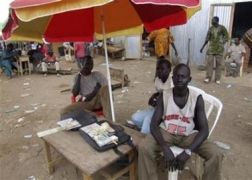Peace brings need for speed to south Sudan
April 11, 2007 (JUBA, Sudan) — See a crowd huddled together by the side of a road in Juba and the chances are at its centre is the bloodied mangled machine and dazed driver of yet another motorcycle accident in the capital of south Sudan.
 Typically, the bike will be one of the thousands of cheap Chinese imports that have flooded into Juba, the regional capital, from the Democratic Republic of Congo and Uganda in the last two years.
Typically, the bike will be one of the thousands of cheap Chinese imports that have flooded into Juba, the regional capital, from the Democratic Republic of Congo and Uganda in the last two years.
Sudan is most often in the news for the conflict in the far western region of Darfur. But in the meantime peace has returned to the south after more than 20 years of civil war.
The motorbikes are transported along the roads that have opened since a north-south peace agreement was signed in 2005 — along with other goods like music and clothes in truckloads.
The most common make is the ‘Senke’: a word that is becoming synonymous in Juba with death and blood-splattered lesser accidents often involving child riders, and a new youth culture that comes with caps worn back-to-front, sunglasses, and speed.
“The truth of the matter is that every day we have one, two and often more cases from motorbike accidents, including children. Our records used to list bullet wounds, but these now dominate,” said a nurse at the teaching hospital in Juba, 750 miles (1,200 km) south of Sudan’s capital Khartoum.
The hospital’s USAID-funded new Accident & Emergency wing, freshly painted, is already being nicknamed the ‘Senke Ward’ by members of the public, said another nurse.
Injured victims overflow onto the yard and verandas, often lying on nothing more than brown paper.
“I like to ride until I fly, so the water runs from my eyes,” says Michael Dut who is in his late teens. His eyes dreamily fix on the horizon as he describes the experience.
He’s not the only one. Young men on motorbikes crowd the markets day and night, buzzing around in pairs or with a girl on the back.
SPIRIT OF HEROISM
Away from the main roads pre-pubescent boys speed up and down, heads tilted back, coolly clicking gears and gathering speed as pedestrians leap out of the way, only to be swallowed in a cloud of dust.
Added to the engine noise, ‘musical’ attachments blurting out annoying jingles or oddly, a baby’s cry, are fixed between the handlebars with plastic cards showing lurid depictions of central African pop stars.
Emmanuel Morris works at the Equatoria Hotel next to Juba’s main road, from where he watches Senkes passing all day.
While the new goods — the music, the clothes, the cheap sunglasses and the bikes — are from neighbouring countries, he said the independent spirit behind the bike obsession is very south Sudan.
“Because of the war the spirit of heroism grew,” said Morris. “There was no freedom then in Juba. Young people could only express themselves militarily, by joining the rebels.
“Now, even the children rent the bikes with their little money; what they are trying to say is that they know something. Even if you gave them a car, they would prefer a motorbike.”
‘BODA BODA’ INCOME
For many young men in Juba, the bikes represent more than freedom and speed, but also an income in a town where unemployment is growing.
The work of a ‘boda boda’, or motorbike taxi, is well known in Uganda, where Sudanese Simon Lole’s family spent the war years. But it’s a new business for him and other young men and boys in Juba, where public transport boils down to one minibus route.
“Before the peace, there was no boda boda, and very few motorbikes,” said Lole. “We got this boda boda idea from Uganda. Business is OK but there is the problem with accidents. I have fallen and all of my friends have fallen, and some of them have died.”
One ‘boda boda’ boy, who declined to be named, has never been to school but saved enough to buy a Senke with some others.
“My parents know, but cannot do anything. The money is needed. It’s much better than selling cigarettes,” he said. Accidents are common, he agreed, looking nonchalant even though he has already had his own.
The immediate worry for the ‘boda boda’ is the traffic police.
“It is a problem for us, now they are just beginning to demand driving permits, but that’s $100 and the new Sudan license plates are another $100, we don’t have enough money to afford these,” said Lole.
The driving test is not very strenuous. You are asked whether you can drive or not by policemen in the Ministry of Interior’s temporary office tent. But it costs another $20 on top of the permit fee.
What with the accidents and the huge holes, banks, ditches and surprising bumps of Juba roads, the mass-produced Chinese motorbikes quickly require servicing.
“These young boys, they take the family bike. I go on the radio asking parents to be more responsible,” said Deng Mejak Deng, Commissioner of the Traffic Police for the state.
Many accidents are unreported but his office recorded over 120 in 2006 and more than 20 deaths, including child drivers.
“We can’t put them in prison unless there’s an accident, but we fine them and then their parents have to come and pay and take the motorbike home,” said Deng. “I tell the family not to let them ride again.”
(Reuters)
